AI-Led Interviews | Hiring Best Practices
Automated Screening Interviews: Definition, Benefits, and Leading Tools
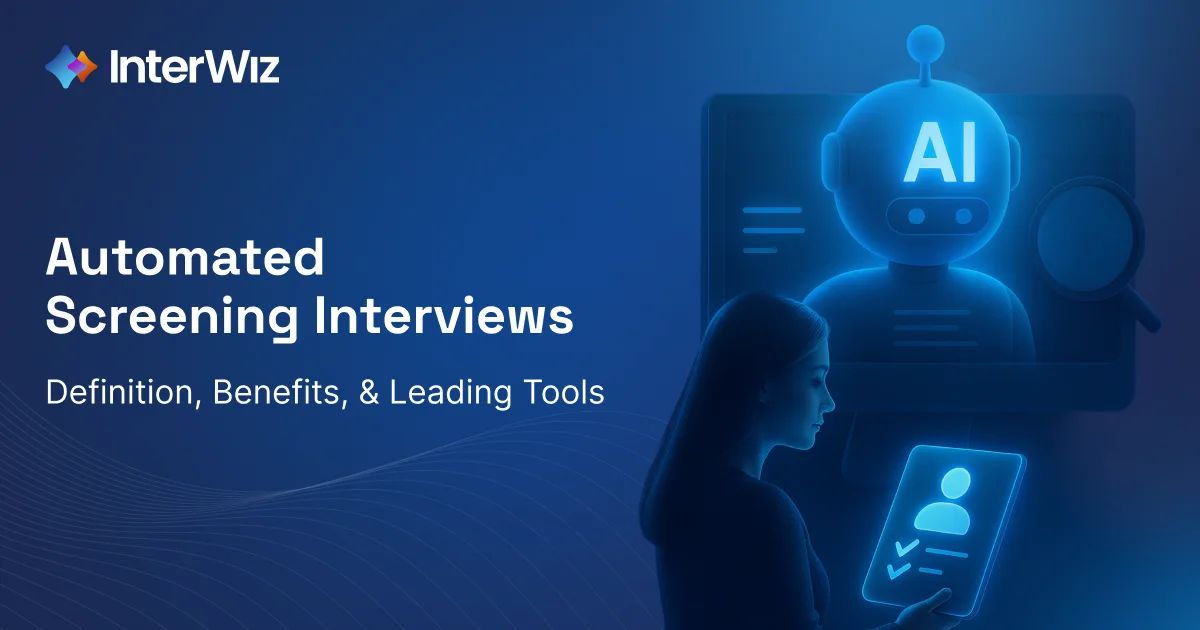
Recruiters spend hours sifting through resumes and conducting first-round calls, yet more than 60% of candidates drop off before an interview is even scheduled. Automated screening interviews solve this by letting AI handle the earliest evaluation stage, reducing manual workload, cutting hiring time by up to 40%, and giving every applicant a fairer shot.
This guide explains what automated screening interviews are, why companies are adopting them, how they work, their pros and cons, and the tools leading in 2025. By the end, you’ll have a clear framework for deciding if automation is the right move for your hiring process.
What Are Automated Screening Interviews?
Automated screening interviews are AI-led interviews designed to replace or supplement the manual first round of hiring. Instead of recruiters conducting dozens of phone screens, candidates complete structured interviews online, often through recorded video, audio, or written responses.
The system then analyzes these responses using natural language processing, skill-matching algorithms, or predefined scoring rubrics, and generates standardized reports for recruiters. This ensures every candidate is measured against the same criteria, removing inconsistencies common in human-led screening.
For example, a staffing agency facing 500 applicants for a single role can quickly filter down to a shortlist of 50, saving recruiters days of manual effort while ensuring no promising candidate is overlooked.
Why Companies Are Adopting Automated Candidate Screening
Companies are turning to automated candidate screening interviews because traditional hiring is too slow, inconsistent, and costly. Research shows the average time to hire ranges from 22 to 43 days, and over half of recruiters report losing qualified candidates during scheduling delays. Automation closes this gap by ensuring interviews happen instantly, not weeks later.
The biggest drivers of adoption include:
Speed – AI reduces early-stage screening time from hours to minutes, keeping top candidates engaged.
Scalability – A single system can process thousands of applicants without straining recruiter capacity.
Consistency – Every candidate is asked the same questions, reducing bias and improving fairness.
Cost savings – Automating repetitive tasks lowers reliance on large recruiting teams and reduces cost-per-hire.
How Automated Screening Interviews Work
Automated screening interviews follow a structured process that minimizes manual recruiter involvement while ensuring candidates are consistently evaluated.
Interview Scheduling and Invitations: Candidates receive automated links via email or an applicant tracking system (ATS), allowing them to complete interviews at their convenience.
Interview Completion: Candidates record video, audio, or written responses to standardized questions. These may assess communication, problem-solving, technical knowledge, or cultural fit.
AI Analysis: The system evaluates responses using natural language processing, sentiment analysis, and skill-matching algorithms. It scores candidates based on clarity, relevance, and role-specific benchmarks.
Reports and Ranking: Recruiters receive transcripts, analytics, and ranked shortlists, making it easier to compare candidates at scale.
Benefits and Limitations of Automated Screening Interviews
Key Benefits
The strongest appeal of automated interviews lies in how much faster and fairer they make the first stage of hiring.
Speed – Early-stage screening that once took days can now be completed in hours. Recruiters focus on high-quality candidates instead of spending time on repetitive phone screens.
Consistency – Every applicant answers the same set of questions, ensuring standardized evaluation and reducing bias from interviewer subjectivity.
Scalability – Companies handling thousands of applications can run screenings simultaneously without overwhelming recruiting teams.
Fairness – AI protocols reduce the risk of unconscious bias by assessing candidates against objective criteria.
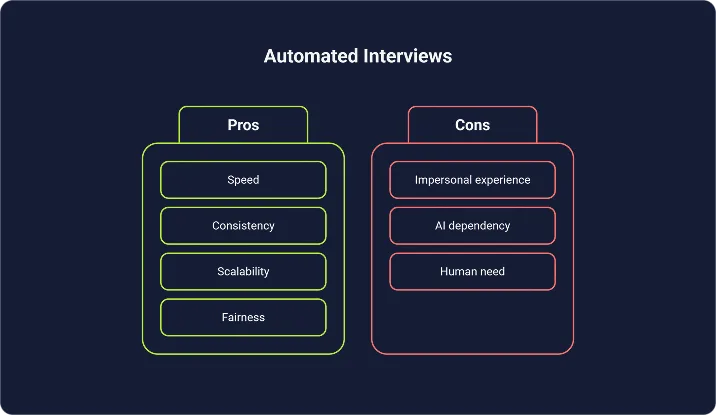
Limitations
Despite the advantages, automation still has boundaries that recruiters need to account for.
Candidate experience – Some applicants may feel automation is impersonal compared to live recruiter interaction.
AI dependency – The quality of results depends on how well the interview questions and algorithms are designed. Poor inputs can lead to weak outputs.
Not a replacement for humans – Automated screening is most effective in the first stage. Human recruiters are still essential for deeper evaluations, cultural fit, and final decisions.
Many platforms stop at basic screenings, but InterWiz goes further by combining automation with in-depth technical, soft skills, and personality assessments. This helps recruiters make decisions with more context rather than relying solely on surface-level scores.
Automated Screening Interviews vs Traditional Screening
Traditional first-round screenings usually involve phone calls or manual resume reviews, while automated screening relies on AI-driven interviews and structured evaluations. The difference is clear: one is slow and inconsistent, the other fast and scalable.
Automated Screening
Automated systems deliver speed, objectivity, and scalability. They can evaluate hundreds of applicants simultaneously, provide standardized scoring, and eliminate common scheduling delays.
Traditional Screening
Manual screening relies heavily on recruiter availability and judgment. While it offers a more personal touch, it often introduces bias, inconsistency, and bottlenecks when handling high applicant volumes.
Comparison at a glance:
Factor | Traditional Screening | Automated Screening |
Speed | Days to weeks | Hours to 1–2 days |
Consistency | Varies by recruiter | Standardized and bias-reduced |
Scalability | Limited by team size | Handles thousands at once |
Candidate Experience | Personal but slow | Flexible, anytime access |
Cost | Higher recruiter cost | Lower due to automation |
Leading Automated Screening Interview Tools in 2025
The demand for automated interviews has driven innovation across the recruitment process. Below is a curated list of the top tools in 2025, covering enterprise platforms, compliance-focused systems, and AI-first challengers.
1. InterWiz – Best for Depth + Accuracy
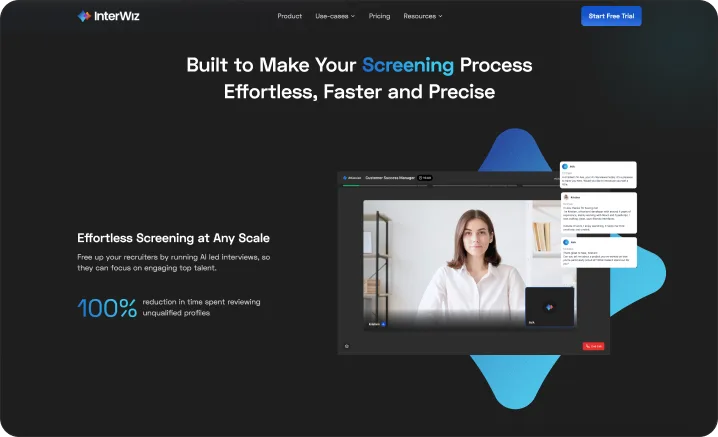
InterWiz is an AI interviewer that combines automated screenings with technical, soft skill, and personality assessments. Unlike most tools that stop at one-way video, InterWiz delivers ranked shortlists, transcripts, and customizable scoring across multiple role types.
Strengths: Multi-skill testing, customizable workflows, and in-depth analytics.
Limitations: Newer in the market compared to legacy providers.
Best for: Tech companies and staffing agencies needing efficient but deep candidate insights.
2. HireVue – Best for Large Enterprises
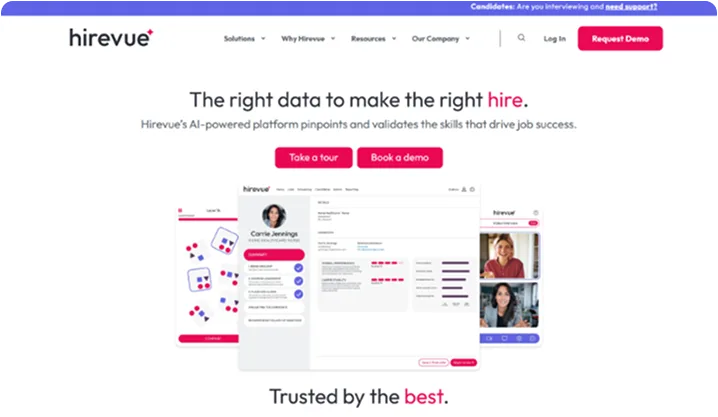
HireVue remains the most established AI video interview platform. It offers video-based screening, game-based assessments, and enterprise integrations. Recently, HireVue has focused on explainable AI to improve trust in automated scoring.
Strengths: Enterprise-grade video AI, global adoption, ATS integrations.
Limitations: Less customizable for technical and niche roles.
Best for: Fortune 500 and multinational companies with high-volume hiring.
3. VidCruiter – Best for Compliance and Security
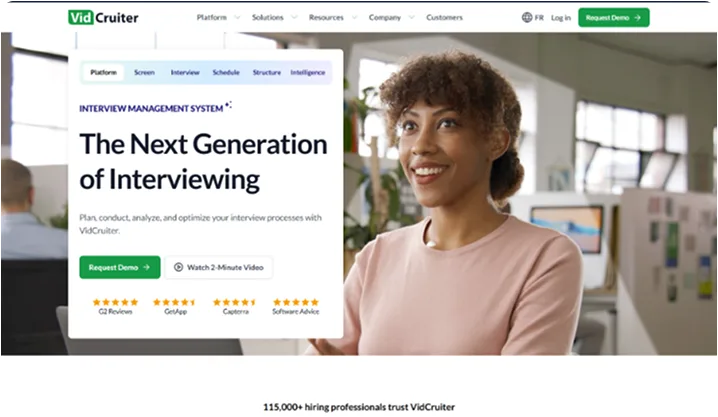
VidCruiter specializes in secure, automated video interviews. It features fraud detection (ID verification, proctoring) and compliance-focused workflows, a growing need as remote hiring scales.
Strengths: Security, compliance, customizable interview flows.
Limitations: Analytics are less advanced than newer AI-native platforms.
Best for: Regulated industries such as healthcare, finance, and government.
4. Spark Hire – Best for Cost-Effective Video Screening
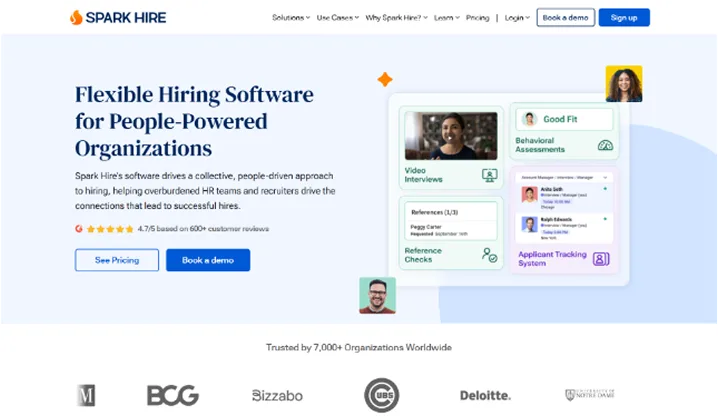
Spark Hire is widely used for its simple, cost-effective one-way video interviews. Recruiters send candidates preset questions, and candidates respond on their own time.
Strengths: Budget-friendly, easy to deploy, popular with SMBs.
Limitations: Limited depth, lacks advanced AI-driven insights.
Best for: Startups and small businesses needing affordable early-stage screening.
5. myInterview – Best for Candidate Experience
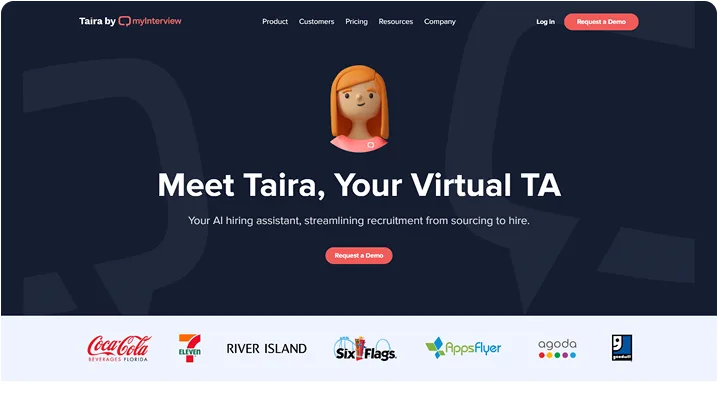
MyInterview emphasizes user experience with AI-assisted video screening and seamless integrations with job boards and ATS systems. It’s designed to feel less “robotic” for candidates.
Strengths: Candidate-friendly design, integrations, and flexibility.
Limitations: Lighter on analytics and benchmarking compared to enterprise tools.
Best for: Companies prioritizing employer brand and candidate experience.
6. Sapia.ai (formerly PredictiveHire) – Best for AI Chat-Based Screening
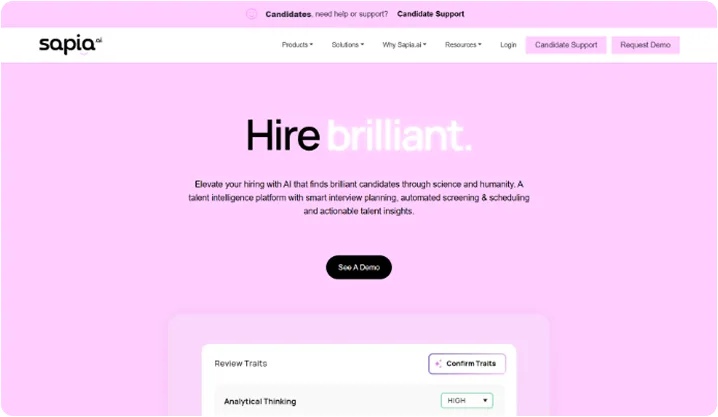
Sapia offers conversational AI interviews conducted via text. Its bias-reduction focus and language analysis are ideal for high-volume frontline hiring where accessibility matters.
Strengths: Conversational AI, diversity and bias mitigation, and high scalability.
Limitations: Less suitable for technical or coding-heavy roles.
Best for: Retail, call centers, and service-based industries.
7. Harver – Best for High-Volume Hiring
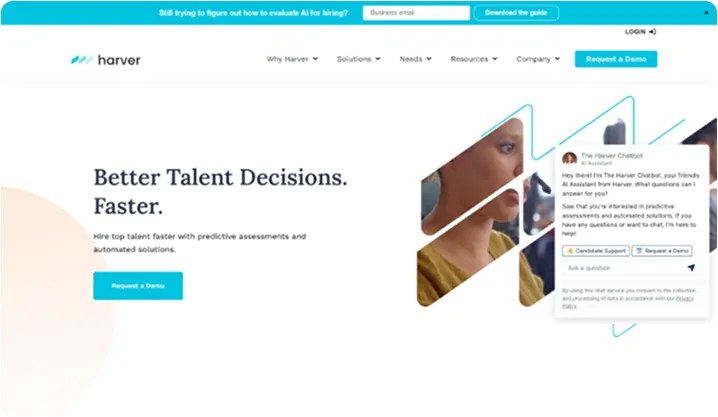
Harver, now expanded with OutMatch capabilities, provides automated screening plus situational judgment, cognitive, and skills testing. It’s designed for large-scale frontline hiring.
Strengths: Volume handling, diverse assessments, ATS integrations.
Limitations: Less flexible for senior-level or niche roles.
Best for: Retail, logistics, and BPO firms hiring at scale.
Quick Comparison at a Glance
Tool | Best For | Strengths | Limitations |
InterWiz | Depth + Accuracy | Multi-skill testing, customizable, analytics | Newer but fast-growing |
HireVue | Large Enterprises | Enterprise-ready, structured video AI | Less flexible for niche roles |
VidCruiter | Compliance + Security | Fraud detection, compliance workflows | Limited advanced analytics |
Spark Hire | Cost-Effective Screening | Affordable, simple, user-friendly | Shallow insights |
myInterview | Candidate Experience | Modern UI, integrations | Narrow analytics |
Sapia.ai | Chat-Based Screening | Conversational AI, bias reduction | Not for technical testing |
Harver | High-Volume Hiring | Strong assessments, volume handling | Less suitable for niche/senior roles |
How to Choose the Right AI Screening Interview Tool
With so many platforms available, the “best” tool depends on your hiring goals, team size, and the types of roles you need to fill. The right choice balances speed, candidate experience, and depth of insights.
Key Factors to Consider
Hiring Volume – High-volume hiring (e.g., retail, call centers) benefits from platforms like InterWiz or HireVue, which can process thousands of applicants simultaneously. Smaller teams may find Spark Hire or myInterview more practical.
Role Types – Technical and specialized roles require platforms that support coding, analytical, or custom assessments. InterWiz stands out here by combining screening with technical and soft skill testing.
Candidate Experience – If candidate perception matters (e.g., employer branding or competitive job markets), tools like myInterview or InterWiz provide user-friendly, flexible interfaces.
Compliance & Security – In regulated industries, VidCruiter’s fraud detection and compliance features are critical.
Budget & Resources – SMBs often prefer cost-effective options like InterWiz, while enterprises can invest in robust platforms like HireVue.
Integrations – Check if the tool connects smoothly with your ATS, HRIS, or broader recruitment stack to avoid workflow silos.
Example Scenarios
A staffing agency handling hundreds of applicants across diverse industries might prioritize a tool like InterWiz for its automated screening plus multi-skill testing.
A global enterprise recruiting for multiple regions would lean toward HireVue for its enterprise integrations and scalability.
A retail chain hiring seasonal workers could benefit from Harver’s high-volume capabilities paired with situational assessments.
Also read: AI Interview Tools: How They Work, Top Picks, and How to Choose.
Bottom Line
Automated screening interviews are no longer experimental; they’re a practical solution to the inefficiencies of traditional hiring. By reducing manual workload, standardizing candidate evaluations, and accelerating shortlisting, they help recruiters focus on what matters most: making better hiring decisions.
The key is matching the tool to your specific needs. High-volume roles, technical positions, or employer branding priorities all call for different platforms. Recruiters who choose wisely can cut hiring times, lower costs, and improve candidate quality without sacrificing fairness.
FAQs on Automated Screening Interviews
Are automated interviews fair to candidates?
Yes, when designed correctly. Automated screening interviews ask every candidate the same set of questions and apply standardized scoring, which reduces bias compared to inconsistent human-led screenings.
What types of roles are best for automated screening?
They are most effective for high-volume and early-stage roles such as sales, customer service, and entry-level technical positions. For senior or niche roles, automated screening works best as a complement rather than a full replacement.
Can automated interviews replace human recruiters?
No. Automated tools handle the repetitive, time-consuming first stage. Human recruiters are still essential for evaluating cultural fit, negotiating offers, and building candidate relationships.
How do candidates usually respond to automated interviews?
Surveys show many candidates appreciate the flexibility of completing interviews on their own time. Some may find automation less personal, which is why combining AI-driven screening with transparent communication is key to maintaining a positive experience.
Do automated interviews work for technical roles?
Yes, but only on platforms that support coding, analytical, or role-specific assessments. For instance, InterWiz offers customizable technical tests alongside traditional screenings, making it suitable for IT and engineering roles.

High Quality Screening with AI Interviews
Automated interviews built for speed, scale, and accuracy.
🔥 Full features, no credit card required.